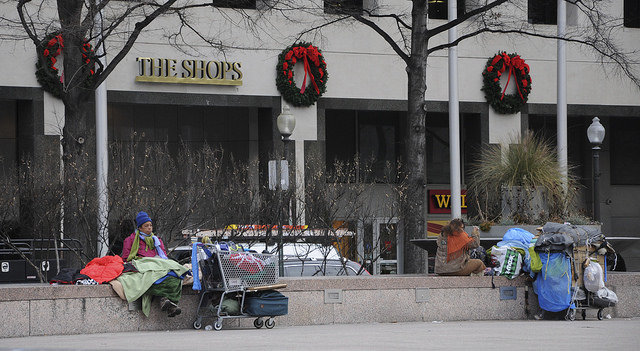In my job as a case manager, I had the opportunity to systematically ask women participating in a dinner program for homeless women, “What is it like to be homeless?”
Their responses make the need for affordable housing painfully evident.
“It’s become difficult to pay rent,” they said. They’re right.
The lack of affordable housing is a national crisis for everyone: college students, the working poor, lower- and middle-class individuals experiencing unexpected catastrophes, and people on fixed incomes. All are swelling the ranks of the homeless. Social scientists say the average person would be out on the street within two months of losing a job or source of income.
Homelessness is not just a problem of substance abusers, the physically handicapped or people with mental illness. It can happen to anyone.
The women told me about being evicted, about how humiliating and emotionally shattering it is to watch all your belongings — family heirlooms, important papers and identification — thrown out into the street, scattered in the wind.
“You begin to feel rootless,” they said.
Exposed, naked, alienated. It seems like the whole neighborhood knows all your business, but doesn’t care. Soon afterward, human vultures pick over your possessions and steal what’s not guarded.
Now homeless, you spend all day looking for hot meals, a place to sit without being told to “move on,” somewhere to take care of bathroom needs and a dry quiet warm space to sleep. There are no safe places to store belongings. Opportunities become elusive.
Discrimination against the poor, especially the homeless, makes it harder to take care of grooming, or more complicated tasks like securing employment with living wages. Even getting a glass of water is a challenge. Nobody wants you around.
You walk everywhere. Transportation and laundromats are not free. In so many little ways, you’re constantly reminded that you are nothing without money.
It’s difficult to get a job when you’re homeless. Employers look at you askance when they discover you live at ”no fixed address.”
If you reside in a shelter, you share a shower and toilet with something like 10 to 25 people. There is no privacy. Some shelters are chaotic, dirty, dangerous environments with rigid schedules. You sleep uneasily among a room full of people, a mix of mothers with children, people with mental or physical illnesses, thieves and combative jerks.
Few people choose to be homeless. Those who sleep on the streets are guarding the only possession they feel they have left: their personal freedom.
The longer a person remains homeless, the more difficult it is to return to the mainstream of society. Being homeless is destabilizing, demoralizing and depressing. You’ve lost your base, a foundation from which to function. It becomes hard to focus. Constant obstacles chip away at your self-esteem and your healthy personality withers, disintegrates, scatters.
You become scared, frustrated, angry, bitter, distrustful. You’re always tired, overwhelmed. Little tasks become chores as depression saps your energy. Stress clouds your judgment. You grab at anything that looks like an opportunity, yet you feel like you’re getting nowhere.
No one should ever be homeless. In a country as wealthy as the United States, affordable housing should be a right, not a privilege.




